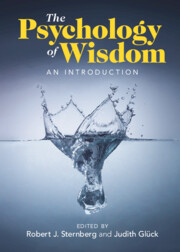Book contents
- The Psychology of Wisdom
- The Psychology of Wisdom
- Copyright page
- Contents
- Figures
- Tables
- Contributors
- Preface
- Part I Introduction to Wisdom Theory and Research
- Chapter 1 Introduction
- Chapter 2 Philosophical Foundations for the Study of Wisdom
- Chapter 3 Folk Conceptions of Wisdom around the World
- Chapter 4 Psychological Theories of Wisdom
- Chapter 5 Wisdom
- Chapter 6 Measurement of Wisdom
- Part II Foundations of Wisdom in the Individual and in the World
- Part III The Modifiability of Wisdom
- Part IV Wisdom in the World
- Index
- References
Chapter 2 - Philosophical Foundations for the Study of Wisdom
from Part I - Introduction to Wisdom Theory and Research
Published online by Cambridge University Press: 26 May 2022
- The Psychology of Wisdom
- The Psychology of Wisdom
- Copyright page
- Contents
- Figures
- Tables
- Contributors
- Preface
- Part I Introduction to Wisdom Theory and Research
- Chapter 1 Introduction
- Chapter 2 Philosophical Foundations for the Study of Wisdom
- Chapter 3 Folk Conceptions of Wisdom around the World
- Chapter 4 Psychological Theories of Wisdom
- Chapter 5 Wisdom
- Chapter 6 Measurement of Wisdom
- Part II Foundations of Wisdom in the Individual and in the World
- Part III The Modifiability of Wisdom
- Part IV Wisdom in the World
- Index
- References
Summary
Chapter abstract (Philosophical Foundations for the Study of Wisdom): A person with practical wisdom reliably grasps how to live and conduct themselves. But what is practical wisdom, how can we get it, and how can we study it? This chapter will introduce some prominent philosophical arguments and answers to these questions. After distinguishing practical wisdom from other types of wisdom, the chapter explains why studying wisdom requires combining both philosophy and empirical science. To illustrate the contribution of philosophy, the chapter motivates a core philosophical conception of wisdom and invites the reader to think through some philosophical puzzles it gives rise to.
- Type
- Chapter
- Information
- The Psychology of WisdomAn Introduction, pp. 15 - 34Publisher: Cambridge University PressPrint publication year: 2022
References
- 1
- Cited by



